Hidden behind the sparkling showrooms, the engaging sales staff, and the deal-closing soaks that power sales at most spa retailers is a largely unsung profit center: the service department.
More than just a crew that handles delivery and installation, a spa retailer’s service department can be a vital revenue source and a critical marketing arm to extend the lifecycle of a customer. For businesses that offer house calls to diagnose hot tub issues, make repairs, provide maintenance, and sell parts and supplies, a service department can act as a retailer’s mobile sales unit.
We spoke to spa retailers across the country about the best practices of running a service department, from staffing issues to tracking performance to optimizing sales. What follows is a wide-ranging primer on how to manage service department operations, offerings, and staff to ensure a return on your store’s investment.
High on Maintenance
For many spa retailers, the lowest hanging fruit—after selling a hot tub and in-store supplies—is the maintenance visit. At Aqua Paradise in San Diego, California, the service department handles both warranty and non-warranty repairs for portable spas. But for owner Jay Gavin, the department’s “quarterly maintenance drain and fills” are vital to the division’s profitability.
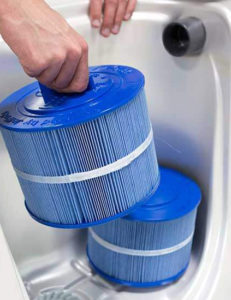 Booking four service calls a year is a great revenue stream. But the visit itself can help grow the bottom line, explains Gavin, because each appointment represents an ideal upsell opportunity. Hot tub owners who call for maintenance “are generally the ones that are most likely to purchase chemicals and other products while we are there,” says Gavin.
Booking four service calls a year is a great revenue stream. But the visit itself can help grow the bottom line, explains Gavin, because each appointment represents an ideal upsell opportunity. Hot tub owners who call for maintenance “are generally the ones that are most likely to purchase chemicals and other products while we are there,” says Gavin.
That connection between servicing and sales is something Gavin examines in detail. “While it is easy to look at a metric like callbacks, a major measurement of productivity is a tech’s ability to upsell in the field. If they have successfully completed a repair and the consumer is happy, then it should be easy to sell chemicals, covers, headrests, or even get them scheduled for a quarterly cleaning.
Still, Gavin concedes not every tech is a natural-born closer. “Sometimes its harder to teach someone to upsell versus making the actual repair.”
Andrew Bari, owner of Westrock Pools in Nanuet, NY, expects his service department to be part of the sales team at his 10,000 square foot store. He invests in training them to be, in a sense, mobile salesmen—and he incentivizes them too. “My service guys have to look neat and clean on the job. They are an extension of my sales people. They are trained to sell replacement covers, sell cover-lifts, sell chemicals and if they do, they get a commission on what they sell.”
While it is easy to look at a metric like callbacks, a major measurement of productivity is a tech’s ability to upsell in the field.
The retail veteran also views his sales team as a business driver for the service department. “When we’re selling a spa, we let them know that we’ve been in business for over 50 years and we service seven days a week for 10 months of the year and six days a week in January and February.”
Optimizing Technology
When it comes to keeping track of service and delivery teams—where they are, when they got there, and when they left— more and more retailers are using GPS tracking technology.
For Casey Thornton, co-owner of Southern Spa and Patio based in Watkinsville, Georgia, tracking her vehicles solves a number of problems.
 “If your customer complains about hourly charges, you can say ‘Here’s the GPS reading where they were at your house for an hour,’” says the owner. Thornton’s family has been in the spa retail business for more than 40 years and she’s heard plenty of stories about delivery and service employees who took long lunches and went on personal errands with the company truck. For her, the GPS eliminates any temptation for a technician to “go off the clock. You know where your staff is.”
“If your customer complains about hourly charges, you can say ‘Here’s the GPS reading where they were at your house for an hour,’” says the owner. Thornton’s family has been in the spa retail business for more than 40 years and she’s heard plenty of stories about delivery and service employees who took long lunches and went on personal errands with the company truck. For her, the GPS eliminates any temptation for a technician to “go off the clock. You know where your staff is.”
Bari also sings the praises of using GPS. “When Mr. & Mrs. Smith call up to complain about a service charge, we can just look up the session. It solves a lot of issues. I have GPS on all my trucks.”
But computer technology can help service departments in other ways.
“We tell customers that if you buy from us, all your purchases are computerized,” says Thornton. “And when you call and say, ‘My pump went out,’ or ‘My heater went out,’ we’ll know the chemicals weren’t the cause. Whereas if we have no history of you buying filters or chemicals, we can’t make an educated diagnosis of what the cause of the problem might be.”
Gavin, too, is devoted to customer data retention—from the moment a service request comes in. “During incoming calls, it’s import to collect vital info on not just the service call, but on what type of supplies the customer might want and upselling drain and fills. We want to make sure that people walking through our doors are aware of the products and services we offer.”
The Retail Rebound
Although Bari’s store has provided servicing for decades, he began optimizing that segment of the business a number of years ago to make up for revenue losses caused by competition from the internet.
“Retailers took a big hit because of e-commerce. Our customers could go online and get their chemicals the next day. I had the foresight to build up my service business,” says Bari.
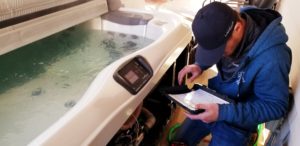 When Westrock’s sales team makes a sale, they now actively tout weekly and bi-weekly maintenance visits from the service department. “We recommend a spa should be drained and refilled every four months and then have their cartridges replaced. We also make customers aware of cover lifts, which eliminate the need for having two people to remove and replace a spa cover.”
When Westrock’s sales team makes a sale, they now actively tout weekly and bi-weekly maintenance visits from the service department. “We recommend a spa should be drained and refilled every four months and then have their cartridges replaced. We also make customers aware of cover lifts, which eliminate the need for having two people to remove and replace a spa cover.”
Bari’s store also encourages customers to come in for a free water test. “We let customers bring their water chemistry in and we test their water and teach them how to maintain their spas.” While that may seem like a counter-intuitive method of promoting service calls, there’s an ulterior motive: “We ask them for their emails”—which they can in turn use to promote service department offers.
New Channels for Business
Just as the internet once hurt spa retailer sales, now, by sending weekly and monthly promotional emails, it can help them. Bari uses these communications “to sell replacement covers, cover lifts, steps, aromatherapy, all types of items that enhance the spa experience.”
He’s not alone. Thornton and Gavin’s staff also actively create more awareness for service departments using email and social media platforms like Facebook and Instagram to power customer engagement. “What we typically do is send out emails to remind people to order supplies, schedule a maintenance appointment, or take advantage of, say, our spa cover replacement offer where we replace a cover and dispose of it. The point is to book a service appointment, drive them to the store for supplies, or [have them] order supplies for delivery.”
What we typically do is send out emails to remind people to order supplies, schedule a maintenance appointment, or take advantage of, say, our spa cover replacement offer where we replace a cover and dispose of it.
Gavin of Aqua Paradise has taken to automating reminders for his customers and uses a CRM tool to store the names in their database. “Following up to set that next appointment is imperative,” he says. “We use in-house reminders and a CRM to automate a reminder for consumers 90 days after their most recent appointment.”
Thornton says she gets a good deal of business from an old-school channel—the real estate industry. “Our store is right outside of Athens, a college town. So we have professors who own houses but go and teach elsewhere or take sabbaticals. So they’ll rent out their home. And we’ll get calls to go over things with new tenants. It’s the same with new homeowners. The realtor will call us, and we will conduct a spa inspection before new owners purchase a house.”
While Thornton doesn’t currently pursue realtors for servicing leads, she does think about actively connecting with realty organizations. “It could be something we focus more on. It would be smart for us to do.”
Warranty and Parts
If there’s one challenge in the service business, it’s making repairs for hot tubs that are under warranty. From Gavin’s point of view, these are the least profitable interactions, although part of that has to do with his philosophy of meeting and surpassing customer expectations.
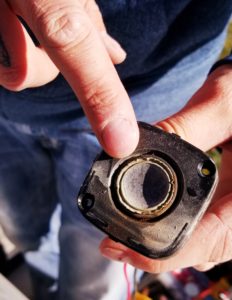 “Consumers have a certain set of expectations for when something is under warranty and one of those expectations is that they won’t have to pay anything out of pocket,” he explains. “So in an effort not to disappoint them, we don’t have any markup [on parts and service] but that is also why it’s an important upsell opportunity for chemicals and filters. Upselling while there is imperative.”
“Consumers have a certain set of expectations for when something is under warranty and one of those expectations is that they won’t have to pay anything out of pocket,” he explains. “So in an effort not to disappoint them, we don’t have any markup [on parts and service] but that is also why it’s an important upsell opportunity for chemicals and filters. Upselling while there is imperative.”
With limited ways to make money on warranty servicing, having an efficient, diagnosis-the-issue-and-fix-it service is vital. Making multiple trips to complete a servicing job quickly adds to the cost of doing business.
According to Gavin, this is when it becomes even more critical to have every possible part you could conceivably need on hand. “Parts inventory is vital.” That’s because even the most technically articulate customer can’t be expected to diagnose their hot tub’s issues over the phone. So a service tech needs to be prepared for everything—or face the prospect of making making multiple trips.
“You don’t know if you are going to arrive on site only to find more than one issue at hand,” he says. “Having all the parts means that instead of making two trips. Now we can be done in one and the consumer is that much happier for it.”
Start-Ups & Outsourcing
Having a large customer base is an enormous asset for any service department. That reality presents a challenge to newly opened retailers who are starting their business from ground zero. Chris Ogden says he learned some hard lessons when he started as manager of Time Machine Hot Tubs in Longview, Texas, nearly three years ago.
Ogden, who cut his spa retailing teeth working for a store with 30 years of sales and over 10,000 customers behind it, had a delivery manager and a service manager on the payroll when his new store opened. That proved “a tactical misstep,” says Ogden.
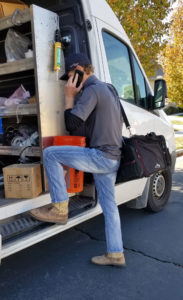 “We were fortunate that we sold a lot of hot tubs and kept them somewhat busy,” the manager says. But ultimately, he found the service department was unsustainable.
“We were fortunate that we sold a lot of hot tubs and kept them somewhat busy,” the manager says. But ultimately, he found the service department was unsustainable.
After a year, Ogden found a spa delivery and service company. “We started subcontracting our work, and that was the best move we could have made. We didn’t have to keep a fleet of service vehicles or pay for staff when there’s no work on order. It helped both companies grow and become much more profitable.”
The retailer and the contractor now have a symbiotic relationship. “We have a large internet presence, and we get calls from people who need help with their ‘sea monkey’ hot tubs,” says Ogden, using his catch-all term for ancient spas. “We send that business to our subcontractor, Spa & Pool Rescue, and we send the customers who buy our hot tubs to them as well.”
Meanwhile, the employees at Spa & Pool Rescue drive sales to Time Machine Hot Tub. “They can earn commissions by suggesting customers trade in their faltering hot tub and get a new spa with us.”
Ogden is delighted with the store’s current servicing arrangement. “Money isn’t everything, peace of mind has value too,” he says. “I get to focus on sales, marketing, the showroom, social media and do what I love to do.”
The Most Important Thing
As for the single most crucial aspect of running a successful service center, it depends who you ask.
Aqua Paradise owner Gavin sums it up in one word: “Inventory. If you don’t have it, you can’t sell it.” He also notes that not having the right part or product on hand creates added costs for a retailer. “Making return trips for a single call will rapidly erode profitability.”
The key to having a successful service center is having an honest, trustworthy service department.
For Thorton of Southern Spa and Patio, “The key to having a successful service center is having an honest, trustworthy service department. There’s a lot of money to be lost with repair guys who decide they’re going to offer a discount service on the side. So you need to treat employees well and pay them sufficiently.”
The essential ingredient for a service department for Bari is “being hands-on and attentive. Make sure you speak to the customers—call in advance to confirm appointments and then make sure they are satisfied after the service call is done.”
According to the owner’s logic, a happy client begets more clients: “I believe more than 50% of my spa sales are from referrals from customers I’ve sold to already. So customer satisfaction is absolutely crucial when it comes to building a thriving business.”


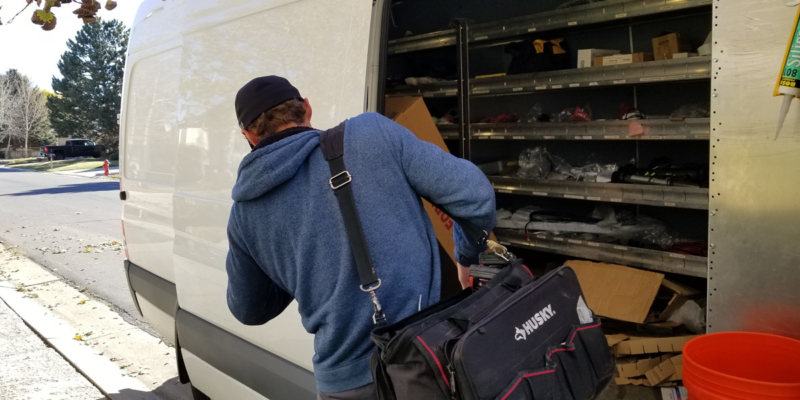




I’m glad you said that a spa retailer’s service department may be more than just a team that handles delivery and installation; it can also be a crucial income stream and a crucial marketing tool to increase customer retention. Speaking of, after noticing some issues with the functionality of his spa, my brother has decided to seek professional help to ensure it is in optimal working condition. He understands the importance of regular maintenance and wants to find a skilled spa repair expert who can diagnose and fix any problems to ensure he can continue enjoying his relaxation time.